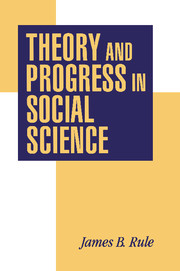Crossref Citations
This Book has been
cited by the following publications. This list is generated based on data provided by Crossref.
Camic, Charles
and
Gross, Neil
1998.
Contemporary Developments in Sociological Theory: Current Projects and Conditions of Possibility.
Annual Review of Sociology,
Vol. 24,
Issue. 1,
p.
453.
Bassett, Keith
1999.
Is there progress in human geography? The problem of progress in the light of recent work in the philosophy and sociology of science.
Progress in Human Geography,
Vol. 23,
Issue. 1,
p.
27.
Beed, Clive
and
Beed, Cara
1999.
Intellectual Progress and Academic Economics: Rational Choice and Game Theory.
Journal of Post Keynesian Economics,
Vol. 22,
Issue. 2,
p.
163.
Walker, Henry A.
2000.
Three Faces of Explanation: Rethinking the Theory Project.
Sociological Focus,
Vol. 33,
Issue. 1,
p.
41.
Angstrom, Jan
2000.
The sociology of studies of ethnic conflict: Explaining the causal status of development.
Civil Wars,
Vol. 3,
Issue. 3,
p.
23.
Therborn, Göran
2000.
At the birth of second century sociology: times of reflexivity, spaces of identity, and nodes of knowledge.
The British Journal of Sociology,
Vol. 51,
Issue. 1,
p.
37.
Bruhn, John G.
2001.
Why Can't Sociology Apply Itself? Progress and Limitations in Making Sociology Useful.
Sociological Practice,
Vol. 3,
Issue. 3,
p.
189.
Angstrom, Jan
2001.
Towards a typology of internal armed conflict: Synthesising a decade of conceptual turmoil.
Civil Wars,
Vol. 4,
Issue. 3,
p.
93.
Webster, Murray
and
Whitmeyer, Joseph M.
2001.
Applications of Theories of Group Processes.
Sociological Theory,
Vol. 19,
Issue. 3,
p.
250.
Mears, Daniel P.
and
Stafford, Mark Christopher
2002.
Central Analytical Issues in the Generation of Cumulative Sociological Knowledge.
Sociological Focus,
Vol. 35,
Issue. 1,
p.
5.
Webster, Murray
and
Whitmeyer, Joseph M.
2002.
Modeling Second-Order Expectations.
Sociological Theory,
Vol. 20,
Issue. 3,
p.
306.
Szostak, Rick
2003.
Classifying Natural and Social Scientific Theories.
Current Sociology,
Vol. 51,
Issue. 1,
p.
27.
Schmid, Michael
2003.
Soziologischer Funktionalismus.
p.
279.
KRAUSZ, ERNEST
2004.
The Elements of Rationality and Chance in the Choice of Human Action.
Journal for the Theory of Social Behaviour,
Vol. 34,
Issue. 4,
p.
353.
Huber, Joan
2004.
Lenski Effects on Sex Stratification Theory.
Sociological Theory,
Vol. 22,
Issue. 2,
p.
258.
Bös, Mathias
2004.
Advances in Sociological Knowledge.
p.
221.
Szostak, Rick
2005.
Evaluating the historiography of the Great Depression: explanation or single‐theory driven?.
Journal of Economic Methodology,
Vol. 12,
Issue. 1,
p.
35.
Bös, Mathias
2005.
Die Entwicklung des soziologischen Wissens.
p.
257.
Moran, Timothy Patrick
2005.
Kuznets’s Inverted U-Curve Hypothesis: The Rise, Demise, and Continued Relevance of a Socioeconomic Law.
Sociological Forum,
Vol. 20,
Issue. 2,
p.
209.
Gerring, John
2005.
Causation.
Journal of Theoretical Politics,
Vol. 17,
Issue. 2,
p.
163.


